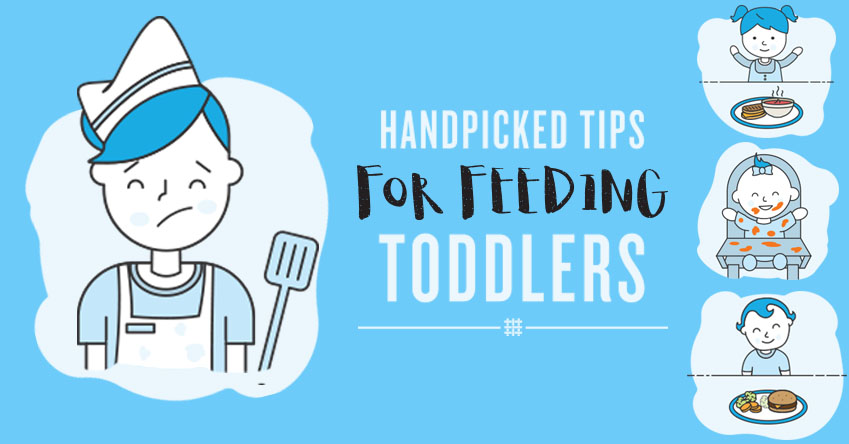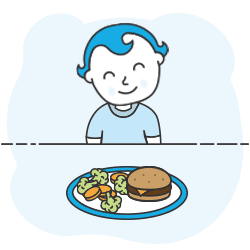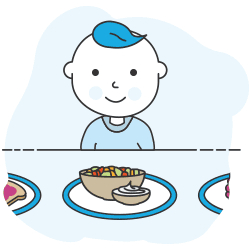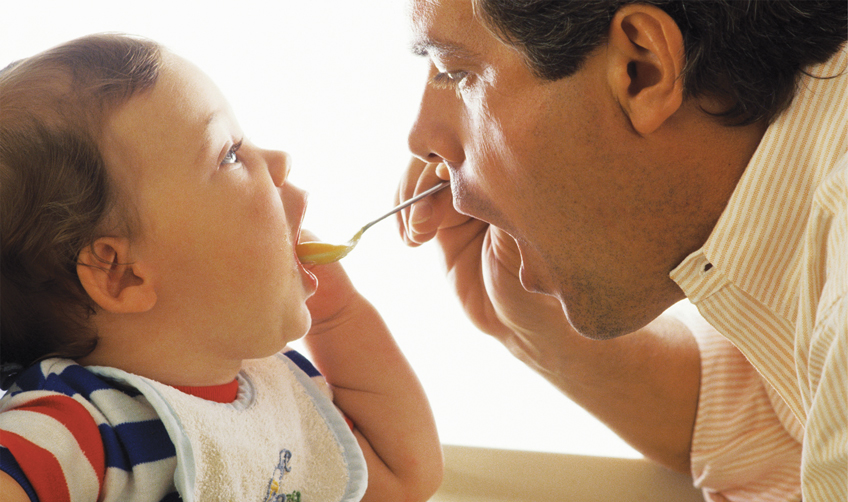
Toddlers can be stubborn about food. (About anything, really, but especially food.) As parents, we know it’s important for our kids to eat well. According to a recent national survey, “nearly all parents (97%) agree that eating habits during childhood will have a lifelong impact on their child’s health.” But day-to-day, feeding our little ones can be a struggle. Another survey showed that “getting a toddler to eat green vegetables” ranked third among the toughest things to do in life, right behind “advanced algebra”and “time travel.” (I made up that last survey, but you get the point.)
As with most parenting challenges, understanding more about child development can be helpful, so here’s some advice — equal parts science, psychology and real-world experience — to guide you in forming healthy toddler eating habits.

You provide…
It’s a parent’s job to provide healthy foods, and your work is done once you’ve served them. Your child may eat a lot or a little, and that’s okay. Stick to your routine, serving three healthy meals and two or three snacks a day.
…they decide.
You can encourage them to eat, of course, but don’t force it. Let them decide how much of what you’ve served they want to eat. The pressure that comes with forcing your child to eat something or “clean your plate” can make mealtime an unhappy experience. Research shows that kids react negatively when pressed to eat. And in the long-run, it doesn’t help them like new foods, even when they’re offered a reward for trying them.
 Think long-term.
Think long-term.
It can be hard, but try not to worry too much if they don’t eat well each and every day. Studies show that young kids usually get enough of what they need, over time, as long as they’re consistently given healthy food choices. That said, check with your doctor or health care provider if you’re concerned about your child’s diet or overall development.
You’re a parent, not a short-order cook. 
Try your best to not provide an alternative meal if your child refuses to eat what you’ve served. This can develop into a pattern in which they will only eat their three or four favorite foods and nothing else. From personal experience, this is one of the hardest skills to learn as a parent. Of course, it’s a good idea to always include at least one healthy thing your child will usually eat.
 Trust them to say when.
Trust them to say when.
When your child says they’re full, take their word for it. Children’s hunger levels change constantly as their bodies grow and develop. It’s sometimes hard for me to believe that my little guy can be full after just five bites, but I remind myself that allowing him to listen to his own hunger and fullness cues is helping him learn to not overeat and to let his body guide his choices in eating.
Think about their taste buds. 
Vegetables have a hard time competing with the taste of candy, yogurt and juice because humans are hard-wired to love sweet things and mildly dislike bitter. But that doesn’t mean your child’s taste can’t be shaped, for better or worse. The more exposure your child gets to sugary, salty and fatty foods, the less they’ll enjoy naturally-flavored foods like veggies.
 Watch your language.
Watch your language.
Children often live up to the expectations set for them by their parents, and their little ears are always on, so do your best to avoid referring to your child as a “picky eater” or “fussy” or “the one who only eats crackers.” Instead, use the power of your words for positive reinforcement: “Look at how you’re using your spoon to eat your soup!” “Looks like you love dipping your carrots!” “I love eating with you.”
Don’t stress about the mess. 
Little kids are messy eaters because their motor skills are still developing, and because exploring things with their senses (especially their hands) is part of how they learn. Kids are also very in tune with their parent’s emotions, and your anxiety can get in the way of their willingness to eat, so do your best to relax and accept the mess.
 Things change.
Things change.
Your little one is growing, learning and changing all the time. One day they’ll eat broccoli, the next day they won’t. It can seem strange and irrational, but it’s normal for their food likes and dislikes to change, so don’t let it get you flustered.
The main takeaways from these tips are to try to keep your expectations realistic, avoid the battles, and do your best to support your toddler with attention, love and understanding. That’s the healthiest diet of all.





